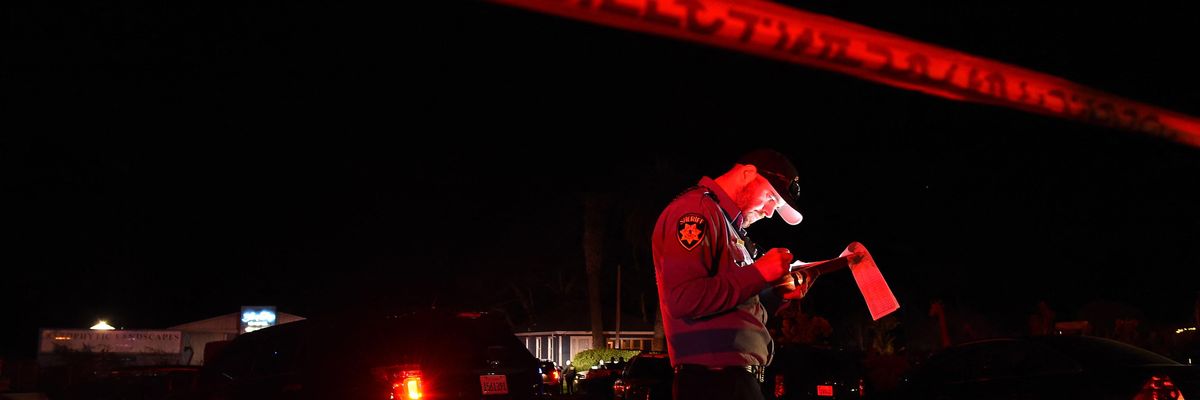A gunman killed at least seven people in the small California city of Half Moon Bay on Monday, the second mass shooting in the state in three days and one of nearly 40 that have occurred since the start of the new year—a rolling epidemic of violence that Congress has repeatedly met with inaction or inadequate compromises with gun lobby-backed Republicans.
The Associated Press reported that police "arrested a suspect in Monday's shootings, 67-year-old Chunli Zhao, after they found him in his car in the parking lot of a sheriff's substation." Officers found a semi-automatic handgun in the suspect's vehicle.
"Four people were found dead and a fifth injured from gunshot wounds at a farm, and officers found three other people killed at another location several miles away," AP noted. "Officials believe Zhao is a worker at one of the facilities and that the victims were workers as well."
The deadly shootings at two separate locations on Monday came after a gunman massacred 11 people in Monterey Park, California on Saturday. Investigators reportedly collected more than 40 bullet casings at the dance studio where the mass shooting took place. The gunman, 72-year-old Huu Can Tran—who took his own life—had previously been arrested for unlawful possession of a firearm.
Police said the gunman used a semi-automatic pistol with an "extended large-capacity magazine."
"It's not clear how the shooter obtained the gun, which was a Cobray M11 9mm semi-automatic weapon compatible with 30-round magazines," Vox's Nicole Narea wrote Monday. "It's also not clear whether the shooter legally obtained a second weapon recovered from inside his van—a handgun that he used to fatally shoot himself. The second weapon can be bought in California; the first has been banned in the state for more than three decades.
"That the semi-automatic weapon is currently illegal in the state makes California unusual; such weapons can be legally purchased in the majority of the U.S.," Narea observed. "And that's led California politicians to call not just for stronger laws in the state, but across the U.S."
The latest string of mass shootings sparked an all-too-familiar outpouring of grief and anger, the latter directed at lawmakers who refuse to support basic and popular gun-safety measures, prioritizing the interests of profit-seeking gun manufacturers and lobbying groups that help bankroll their political campaigns.
"Every time you vote for a lawmaker who opposes gun safety, you're voting for policies that make it more likely your loved one will be slaughtered," Shannon Watts, founder of the gun control advocacy group Moms Demand Action, said late Monday, pointing to other recent shootings in Des Moines, Iowa and Baton Rouge, Louisiana.
"Every time you vote for a lawmaker who opposes gun safety, you’re voting for policies that make it more likely your loved one will be slaughtered."
According to the Gun Violence Archive, 39 mass shootings have taken place across the United States this month alone, leaving 70 dead and dozens more injured.
"What kind of country are we going to be?" Rep. Jamie Raskin (D-Md.), the top Democrat on the House Oversight Committee, asked late Monday. "This is a national emergency and Congress must act this week."
But with Republicans in control of the House and the Senate closely divided, any substantial legislative action on gun violence is unlikely.
Last year, in the wake of a massacre at an elementary school in Uvalde, Texas, President Joe Biden signed into law a bipartisan measure that includes expanded background checks and incentives for states to enact red flag laws. Gun control advocates slammed the bill as "crumbs" and demanded much more—from universal background checks to a ban on assault weapons.
On Monday, a group of Democratic lawmakers introduced legislation that would "ban the sale, transfer, manufacture, and importation of military-style assault weapons and high-capacity magazines and other high-capacity ammunition feeding devices."
"It is far past time to reenact an assault weapons ban and get these weapons of war out of our communities," Rep. David Cicilline (D-R.I.) said in a statement. "We passed the assault weapons ban in the House last year with bipartisan support, which was then blocked by Senate Republicans. We need to come together to enact this commonsense, effective, and proven policy to reduce gun violence and save lives."




